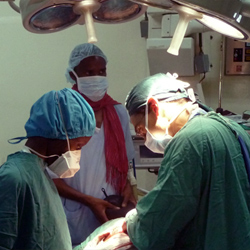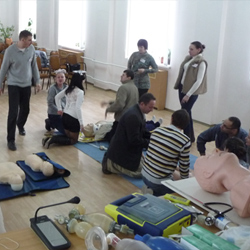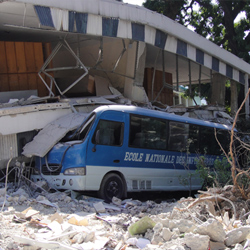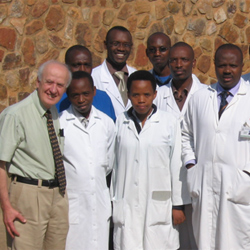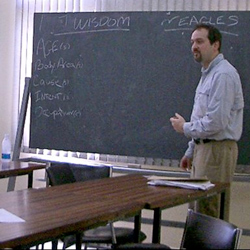MUHC surgery teams making a world of difference
By Tamarah Feder
Injury is the number one cause of death for people under the age of 49 in countries such as Rwanda, Tanzania, Uganda, Ukraine or Haiti. Contrary to what one might imagine, these injuries are not necessarily a result of political violence or natural disasters. Rather, most are more likely to be a result of the kinds of accidents that occur on a farm, on a city street, and even as a result of recreational activities.
The reason the death toll is so high isn’t that more people actually get injured, but that the medical capacity to tend to people in dire need of surgery and living in many mid -and low-income countries, are stretched beyond their limits. To illustrate this, consider that there are only 16 general surgeons in Rwanda – a country of 8 million people. By comparison the MUHC has approximately 40 general surgeons across all sites.
Medical professionals and governmental representatives from around the world have been reaching out to the MUHC’s Centre for Global Surgery – a group of volunteer MUHC-based surgeons and educators who lend their skills to countries in need.
That relatively ad hoc group of dedicated doctors has grown to include a greater range of healthcare professionals from nurses to students. It has also evolved into a more robust program that extends beyond on-site clinical work, to support existing medical faculties and institutions through education and research programs, exchange programs, and the development of local trauma systems.
Overseeing the centre are two extraordinary trauma surgeons and committed volunteers: Dr. Tarek Razek, who is the chief of the MUHC’s Division of Trauma Surgery and director of the Adult Trauma Program, and Dr. Dan Deckelbaum, who is assistant professor at the MUHC’s Divisions of Trauma and General Surgery. Dr. Razek’s experience includes being a war surgeon in Sudan and a surgical response team member in Haiti. Dr. Deckelbaum has done extensive on-site clinical work in government hospitals in East Africa, as well as disaster response missions to Somalia, Kenya, Turks and Caicos, and Haiti.
Taking inspiration from the adage “If you give a man a fish, he eats for one day; but if you teach him how to fish, he eats for lifetime”, they have expanded the centre by developing strong local alliances with universities, hospitals, and governments to develop programs that enhance, fortify and grow local surgical teams.
The centre differs from some other volunteer medical organizations as it provides its services by invitation from the host country. By employing a collaborative and consultative approach with their host colleagues, the centre’s volunteers develop and teach curricula that address gaps identified by host. Before accepting an invitation, the centre does extensive research and groundwork to match the right volunteers who are provided with a solid understanding of the needs.
“It is critical to have a strong grasp of what is happening in the region from a surgical point of view. Then we can help in a range of areas including setting up trauma, general surgery, and operating-room data bases. This kind of information can be immensely helpful as they create an opportunity to evaluate the educational program as well and the country’s overall healthcare situation, which can help guide a country’s healthcare policy.”
Once an invitation has been accepted, MUHC medical volunteers set-up and deliver a year-long training program, broken down into two-week blocks and that cover areas such as trauma and pediatric surgery. Some surgeons such as Dr. Jean-Martin Laberge of The Children’s take on roles such as building a pediatric surgery curriculum.
Not all surgeons are cut out for this line of volunteer work. Those who are interested must demonstrate an understanding of global health and an appreciation of the environment in which they will be working. This is a volunteer effort in every sense; participants are not paid for their activities – not even a per diem. For those MUHC doctors, nurses and students who are part of this program, the investment goes beyond their time and dedication – it often comes out of their own pocket too. But for them it is a way of engaging in the global community. “It’s amazing to see the willingness and interest from surgeons.
Both doctors acknowledge that generous benefactors and the MUHC Foundation have been immensely helpful in covering some expenses. “We’re very efficient with our money. This Centre is run in a very austere way. We managed to send 17 surgeons to Rwanda for less than $26,000,” says Razek. Deckelbaum nods in agreement, “Sustaining our funding is one of our biggest struggles. Then he smiles, “We certainly wouldn’t turn away anyone who wants to help out.”
While there may be delicate political aspects taking place in some of the countries that call on the centre for help, and although the issue of medicine itself can carry some political baggage, Deckelbaum and Razek maintain the centre is not political. “We don’t take political stands. We are non-partisan,” asserts Deckelbaum. “For example, we were working recently in Palestine and the next day we were in Israel teaching courses on global health at a med school there.”
The safety of the invited volunteers is top-of-mind and addressed by diligent preparation. “We go in under very controlled circumstances. If the environment isn’t right then we don’t go”, assures Razek. Both he and Deckelbaum draw on their experiences in far more complicated contexts. “We are quite careful as to how we select what, who, with whom, and how. Then a senior member of our group will go and vet the environment even before we determine it is the right thing for us to be doing. We feel very safe. There has never been an instance of insecurity,” says Razek confidently.
Although there is a righteousness to this work, some might be concerned that precious Quebec surgeons may be distracted from the needs at home. “Our priorities and obligations are always here first.” Razek says, “We do the same kind of development activities in Montreal, and in the far north of Quebec and South Shore, too. It’s an extension of what we do at the MUHC. We train young surgeons here to become great surgeons.”
The workload and emotional durability required to run the centre and meet such daunting needs may seem like a lot to take on, but Razek and Deckelbaum – and their growing roster of approximately 18 volunteers – find this extra work nourishes, rather than takes away from, the work they do at the MUHC.
In managing the more heart-wrenching aspects they encounter in their volunteer work, Deckelbaum and Razek share a similar pragmatism and even gratitude when describing the “privilege of being able to do what we do.” Acknowledging the hardship can be immense, but Deckelbaum puts it into perspective, “We’re professionals. This is what we do. If you think you’re going save the world … that’s not going to happen. You need to set achievable expectations and goals.
Both reveal a subtle and genuine modesty about the impact they and their colleagues have through the centre, and how their support is better equipping distant colleagues to save lives, “We’re never going to cure Africa of injury, but we are forming partnerships and starting small training programs.”
Razek adds, “The world is a horrific place and a gorgeous place, but it’s important to know what kind of place it really is. We can’t be weighed down by all the things we can’t change. Am I going to fix the world? No. But we meet some phenomenal people and get exposed to their communities and cultures. It’s the same thing here in Montreal, too.”

